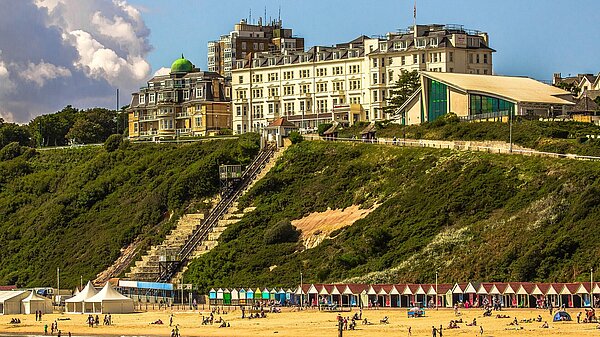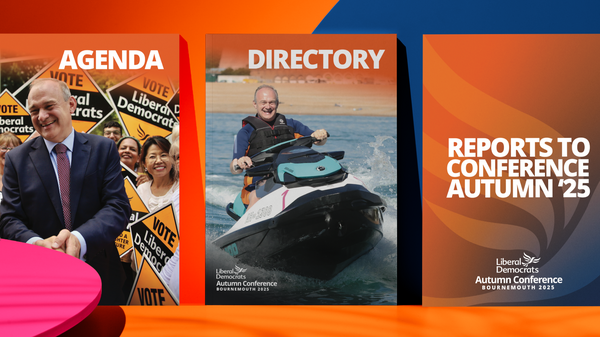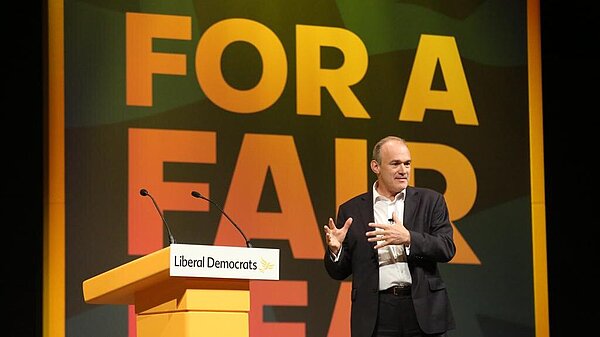Connecting Communities – Building a Transport Network Fit for the 21st Century
F22 - Policy Motion
Motion as passed by conference
Conference notes that:
- Rail fares rose by 3.8% in 2022, 5.9% in 2023, 4.9% in 2024 and 4.6% in 2025.
- The Government has begun to bring rail operators into public ownership, with Transport Secretary Heidi Alexander saying she “would love to be able” to guarantee lower fares.
- Rail electrification is at a standstill and proposed new lines such as East–West Rail are not planned to be fully electrified.
- The Conservatives in Government promised but failed to establish Great British Railway (GBR) – and the Labour Government expects GBR to be operational in 2027 at the earliest.
- The Conservatives’ cancellation of the second phase of High Speed 2 (HS2) significantly undermined public confidence in the UK's ability to deliver such projects on time and on budget.
- The Labour Government cancelled the Restoring Your Railway programme, which sought to reverse the devastating impacts of the Beeching cuts.
- Liberal Democrats champion passenger standards and successfully worked to ensure that an independent body will be established to monitor the impact of the Passenger Railway Services (Public Ownership) Act 2024 on passenger standards.
- Women often face heightened risks and anxiety when travelling alone on trains at night, particularly when services are infrequent and or stations are unstaffed.
- The Network Railcard is currently limited to the London and South East Network area, leaving much of England without an equivalent offer and creating a clear regional disparity in rail affordability and access.
Conference believes that:
- Getting rail back on track as a reliable, affordable and convenient form of transport is critical to a thriving economy, healthier living and equality.
- There is still a place for the private sector in the operation of rail services; renationalising the railways will not automatically make fares cheaper or improve passenger experience and the Government has no clear plan to improve reliability or make fares more affordable.
- Trains are not working properly for passengers; people are paying more for poorer services, and our rail ticketing system is over–complicated.
- Rail freight is the most carbon–friendly way to move goods and helps to make air cleaner.
- The UK should learn from our European neighbours, embracing on–rail competition between operators and competitive tendering to increase services, deliver newer trains, grow passenger numbers, and reduce subsidies.
- Tackling safety concerns on rail, particularly at night, is essential to ensuring women and other passengers who may feel vulnerable can travel confidently and safely.
- The regional restriction of Network Railcard discounts is unfair and contributes to perceived regional disparities in rail affordability within England.
Conference reaffirms pledges to:
- Freeze rail fares this year and overhaul rail fares to offer passengers the best value for their journey.
- Deliver Northern Powerhouse Rail to connect cities across the North of England.
- Review the Conservative Government’s cancellation of HS2’s leg to Manchester with a view to reversal or alternative delivery in whatever way provides value for money: by encouraging private investment, and ensuring work on the station at Euston resumes without further delays, with level boarding for all platforms.
- Re–invigorate the Access for All (AfA) programme.
- Implement light rail schemes for trams and tram–trains.
- Introduce a national freight strategy which includes the electrification of freight routes.
- Introduce an international rail strategy to support new routes and operators, and permitting other operators to use the Channel Tunnel and HS1.
Conference resolves to put passengers first and:
- Establish nationwide tap–in tap–out ticketing.
- Introduce automatic compensation for cancellations and delays across all operators and ticketing systems.
- Establish digital connectivity standards on rail routes.
- Extend the planned ‘Best Price Guarantee’ across all digital and physical sales channels to ensure passengers are offered the most cost–effective ticket.
- Create a statutory duty on accessibility for the railway.
- Ensure new rail lines are electrified as standard and set clear targets to accelerate the electrification of track alongside the use of battery and hydrogen in appropriate parts of the network.
- Work with national and local government on a new Liverpool to Manchester rail connection.
- Ensure the frequency of late night rail services return to pre–covid levels.
- Mandate that public rights of way for walking, wheeling and cycling are built alongside new railway lines, as well as improving existing railway active travel routes and transforming more disused railway lines into public rights of way.
- Reverse the cuts to Restoring Your Railway.
- Ensure staff are available at railway stations for late night services, that waiting areas are well lit and help points accessible.
- Expand CCTV coverage and enhance real-time reporting tools for harassment or unsafe situations, for example by improving awareness of existing channels such as the British Transport Police text facility, or by developing a dedicated reporting app, with clear rapid response protocols in place.
- Ensure safe and reliable onward travel options from stations at night through coordination between rail operators, local transport providers and licensed taxi services.
- Introduce an UK-wide Network Railcard to address regional inequalities and simplify the rail system for consumers.
Conference commits to hold the Government to account by making sure:
- The Office of Rail and Road (ORR) maintains control of a transparent and fair access regime to encourage the growth of open access and rail freight. In addition, the ORR should be given powers to hold GBR to account for infrastructure and train company performance, including cancellations and punctuality.
- The Passenger Standards Authority is established quickly to monitor standards.
Applicability: Federal, except for i)–ii) (lines 42–45), v) (line 53), and g)–j) (lines 72–80), which are England only.
Motion prior to amendments
Submitted by: 10 party members
Mover: Joe Wright.
Summation: Sue Wixley.
Conference notes that:
- Rail fares rose by 3.8% in 2022, 5.9% in 2023, 4.9% in 2024 and 4.6% in 2025.
- The Government has begun to bring rail operators into public ownership, with Transport Secretary Heidi Alexander saying she “would love to be able” to guarantee lower fares.
- Rail electrification is at a standstill and proposed new lines such as East–West Rail are not planned to be fully electrified.
- The Conservatives in Government promised but failed to establish Great British Railway (GBR) – and the Labour Government expects GBR to be operational in 2027 at the earliest.
- The Conservatives’ cancellation of the second phase of High Speed 2 (HS2) significantly undermined public confidence in the UK's ability to deliver such projects on time and on budget.
- The Labour Government cancelled the Restoring Your Railway programme, which sought to reverse the devastating impacts of the Beeching cuts.
- Liberal Democrats champion passenger standards and successfully worked to ensure that an independent body will be established to monitor the impact of the Passenger Railway Services (Public Ownership) Act 2024 on passenger standards.
Conference believes that:
- Getting rail back on track as a reliable, affordable and convenient form of transport is critical to a thriving economy, healthier living and equality.
- There is still a place for the private sector in the operation of rail services; renationalising the railways will not automatically make fares cheaper or improve passenger experience and the Government has no clear plan to improve reliability or make fares more affordable.
- Trains are not working properly for passengers; people are paying more for poorer services, and our rail ticketing system is over–complicated.
- Rail freight is the most carbon–friendly way to move goods and helps to make air cleaner.
- The UK should learn from our European neighbours, embracing on–rail competition between operators and competitive tendering to increase services, deliver newer trains, grow passenger numbers, and reduce subsidies.
Conference reaffirms pledges to:
- Freeze rail fares this year and overhaul rail fares to offer passengers the best value for their journey.
- Deliver Northern Powerhouse Rail to connect cities across the North of England.
- Review the Conservative Government’s cancellation of HS2’s leg to Manchester with a view to reversal or alternative delivery in whatever way provides value for money: by encouraging private investment, and ensuring work on the station at Euston resumes without further delays, with level boarding for all platforms.
- Re–invigorate the Access for All (AfA) programme.
- Implement light rail schemes for trams and tram–trains.
- Introduce a national freight strategy which includes the electrification of freight routes.
- Introduce an international rail strategy to support new routes and operators, and permitting other operators to use the Channel Tunnel and HS1.
Conference resolves to put passengers first and:
- Establish nationwide tap–in tap–out ticketing.
- Introduce automatic compensation for cancellations and delays across all operators and ticketing systems.
- Establish digital connectivity standards on rail routes.
- Extend the planned ‘Best Price Guarantee’ across all digital and physical sales channels to ensure passengers are offered the most cost–effective ticket.
- Create a statutory duty on accessibility for the railway.
- Ensure new rail lines are electrified as standard and set clear targets to accelerate the electrification of track alongside the use of battery and hydrogen in appropriate parts of the network.
- Work with national and local government on a new Liverpool to Manchester rail connection.
- Ensure the frequency of late night rail services return to pre–covid levels.
- Mandate that public rights of way for walking, wheeling and cycling are built alongside new railway lines, as well as improving existing railway active travel routes and transforming more disused railway lines into public rights of way.
- Reverse the cuts to Restoring Your Railway.
Conference commits to hold the Government to account by making sure:
- The Office of Rail and Road (ORR) maintains control of a transparent and fair access regime to encourage the growth of open access and rail freight. In addition, the ORR should be given powers to hold GBR to account for infrastructure and train company performance, including cancellations and punctuality.
- The Passenger Standards Authority is established quickly to monitor standards.
Applicability: Federal, except for i)–ii) (lines 42–45), v) (line 53), and g)–j) (lines 72–80), which are England only.
Amendments
Amendment One
PASSED
Submitted by: Liberal Democrat Women
Mover: Cllr Donna Harris
Summation: Rebecca Jones
After VII. (line 22), insert:
VIII. Women often face heightened risks and anxiety when travelling alone on trains at night, particularly when services are infrequent and or stations are unstaffed.
After E. (line 40), insert:
F. Tackling safety concerns on rail, particularly at night, is essential to ensuring women and other passengers who may feel vulnerable can travel confidently and safely.
After j) (Line 80) insert:
k) Ensure staff are available at railway stations for late night services, that waiting areas are well lit and help points accessible.
l) Expand CCTV coverage and enhance real-time reporting tools for harassment or unsafe situations, for example by improving awareness of existing channels such as the British Transport Police text facility, or by developing a dedicated reporting app, with clear rapid response protocols in place.
m) Ensure safe and reliable onward travel options from stations at night through coordination between rail operators, local transport providers and licensed taxi services.
Amendment Two
PASSED
Submitted by: North East
Mover: Abrial Jerram
Summation: Mackenzie Gregory
After VII. (line 22) insert:
VIII. The Network Railcard is currently limited to the London and South East Network area, leaving much of England without an equivalent offer and creating a clear regional disparity in rail affordability and access.
After E. (line 40), insert:
F. The regional restriction of Network Railcard discounts is unfair and contributes to perceived regional disparities in rail affordability within England.
After j) (line 80) insert:
k) Introduce an UK-wide Network Railcard to address regional inequalities and simplify the rail system for consumers.
Applicability: New k) in this amendment is Federal.
Amendment Three
NOT PASSED
Submitted by: Enfield
Mover: Steven Adderley
Summation: Rob Wilson
In B., delete the words before the semi-colon (lines 27-28), and insert:
‘There is still a place for the private sector in the operation of rail services where this provides benefits for passengers, and does not either abstract revenue from subsidised services, or prevent a properly co-ordinated timetable from operating;...'
Delete E. (lines 37-40).
Mover: 7 minutes; summation of motion and movers and summation of any amendments: 4 minutes; all other speakers: 3 minutes. For eligibility and procedure for speaking in this debate, see pages 6-7 of the agenda. You can submit a speaker's card online here from Monday 15 September up to 08.45 Sunday 21 September or in person.
The deadline for amendments to this motion is 13.00 Monday 8 September; you can submit amendments online here, see pages 9–10 of the agenda for more information. Those selected for debate will be printed in Conference Extra and Sunday’s Conference Daily. The deadline for requests for separate votes is 09.00 Saturday 20 September; you can request separate votes here, see page 5 of the agenda for more information.


